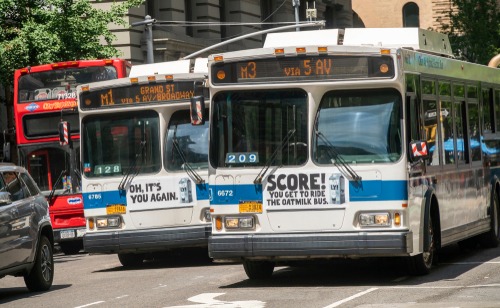
The chances of a reauthorization of the FAST Act appeared diminished Thursday when 11 of 12 Democrat senators on the U.S. Senate Banking, Housing and Urban Affairs Committee backed the bill but just a single Republican senator of the panel’s 12 GOP members bothered to appear for a hearing on the matter, with Sen. Pat Toomey (R-PA), telling his Democrat counterparts that COVID-19 spending and President Joe Biden’s proposed infrastructure bill have provided adequate funding for mass transit purposes.
Toomey said that between last year’s COVID relief packages, annual funding for transit, and the recently passed COVID relief bill, Congress has appropriated an estimated $82 billion for mass transit over the past year, far exceeding the $54 billion it takes to operate all of the mass transit systems in the country. “Add in the capital costs and that’s still less than $82 billion,” said Toomey. “It’s staggering.”
The Biden infrastructure plan would provide another $85 billion for mass transit projects, Toomey insisted. “We could buy every transit commuter in America a $30,000 car,” the senator said.
Toomey’s reticence was supported by at least one of the five mass transit experts testifying at Thursday’s hearing, David Ditch, research associate at the conservative Heritage Foundation, who told senators the federal government should reduce or eliminate funds to expand transit systems, “since existing transit infrastructure is significantly underused, there is no need to subsidize expansion.”
“Rather than throwing good money after bad, Congress should use this year’s highway bill to promote reforms that will increase the value of federal transit spending,” Ditch said.
The five-year Fixing America’s Surface Transportation Act (FAST Act) authorized federal spending on highways and public transportation through FY 2020 and was extended a year through Sept. 30, 2021.
The other experts on the panel disagreed with Ditch and called for additional FAST Act spending. “At a minimum, $85 billion is needed to expand service, modernize facilities, and connect more people and businesses to transit,” John Samuelsen, international president of the Transport Workers Union of America AFL-CIO, told senators. “These investments are an essential component in revitalizing our national economy and global competitiveness. They will also make our transportation system more equitable for and accessible to marginalized communities, begin to address systemic inequities, and bridge the gap for those who need reliable transit to escape poverty and pursue better job opportunities.”
Beth Osborne, director of Transportation for America, called for Congress to use the next surface transportation bill to accomplish three things: to address the maintenance backlog by adopting a fix it first strategy; improve the safety of the nation’s roadways by prioritizing safety over vehicle speed; and to measure the success of America’s transportation system based on how well it connects people to jobs and essential services. “COVID has caused many to lose work, and people are struggling to pay rent, mortgages and car payments. As the economic recovery begins, the number of transit-dependent people who we want to help to get back to work will likely only rise. High quality transit will be an important part of ensuring that everyone gets back to work,” she said.
The Democrat members of the Senate committee, at least the 11 (of 12 members) who spoke, were unanimous in their support of expanded funding.
“Making sure that we don’t see deterioration of our systems is so important,” said Sen. Mark Warner (D-VA).
Sen. Elizabeth Warren (D-MA) emphasized the dependence of working class people on public transportation, particularly buses. She expressed support for a $500 billion proposal to electrify public transit over the next 10 years.
Sen. Robert Menendez (D-NJ) reiterated his support for federal funding for the Gateway Project, which would renovate a 100-year-old railroad tunnel connecting New Jersey with New York City and said there is a $100 billion backlog of projects like that nationwide.
But Toomey’s staunch opposition and the absence of all the other Republicans on the committee indicate the reauthorization of the FAST Act is going to be a difficult climb when it comes to a vote.